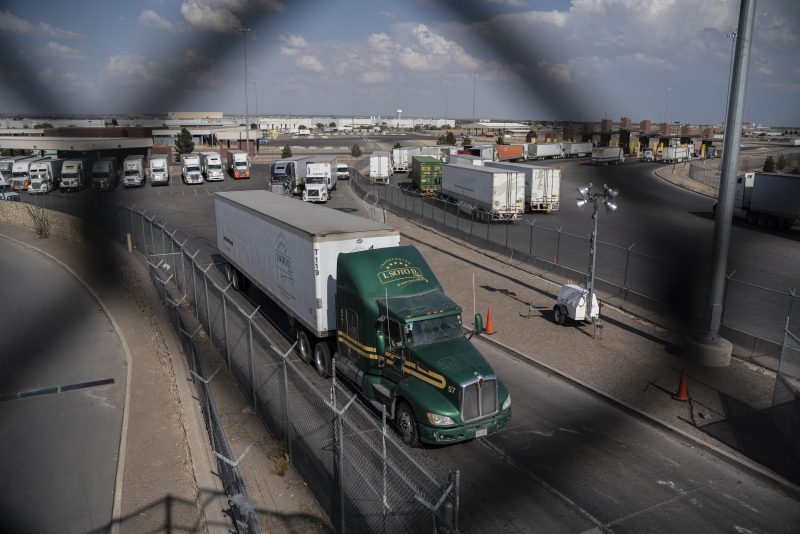Mexico girds for talks on Trump tariff threat
Trump’s tariffs threaten billions of dollars worth of commerce: the commercial port at the US-Mexico border at El Paso, Texas (Paul Ratje)
Washington (AFP) – Mexico’s Foreign Minister Marcelo Ebrard warned Monday that President Donald Trump’s planned punitive tariffs on Mexico would be “counterproductive” for cracking down on migrants, but the White House reiterated Trump’s threat is serious.
But as markets reeled, officials on both sides said they thought a deal could be reached before potentially damaging tariffs on Mexican exports to the United States are put in place on June 10.
“We are in favor of free trade, and we think an agreement can be reached,” President Andres Manuel Lopez Obrador said in Mexico City.
“I want to continue being friends with President Donald Trump.”
Kevin Hassett, chairman of the White House Council of Economic Advisers, told reporters: “Talks have the potential to be extremely fruitful.” He added, however, that Trump is “100 percent” not bluffing with his threat.
– Mexico stunned by Trump threat –
Trump stunned Mexico on Thursday announcing that the United States would place duties on all imports from Mexico, beginning at five percent on June 10 and rising to as high as 25 percent, unless Mexico City took action to halt the hundreds of thousands of migrants crossing into the US from Mexico.
The announcement pummelled the Mexican currency and sent markets in both countries tumbling over fears of a sharp slowdown in trade and high prices for key imported goods on both sides of the border.
Ebrard and other top officials flew to Washington in panic mode Friday after Trump’s announcement.
He was expecting to meet this week with Homeland Security Acting Secretary Kevin McAleenan and also with Secretary of State Mike Pompeo, who was outside the country on Monday, as was Trump.
Meanwhile Mexico’s agriculture minister and economy minister were planning to meet with their counterparts in the Trump cabinet.
Ebrard told reporters Monday that Mexico had already prevented 250,000 migrants from traveling to the US border, and that the only solution to the crisis is a comprehensive development plan for Guatemala, El Salvador and Honduras, where most of them come from.
– ‘Economic instability’ –
“Slapping tariffs, along with the decision to cancel aid programs in the northern Central American countries, could have a counterproductive effect and would not reduce migration flows,” he said.
He said the tariffs would “cause financial and economic instability,” making it even harder for Mexico to address the migrant movements.
Ebrard argued that Mexico had already taken numerous steps under US pressure to slow the flow northward.
Those included letting US asylum seekers remain in Mexico while their applications are reviewed, and also accepting applications for asylum in Mexico itself from more than 24,000 people.
“Without Mexico’s efforts, an additional quarter million migrants would arrive at the US border in 2019,” he said.
But Hassett said Mexico had to take more action, including stopping buses that ferry migrants to the US frontier, which the Trump administration claims are run by criminal gangs.
“The fact is there are a lot of identifiable steps … that the Mexicans could be taking but haven’t been, in terms of stopping the organized crime folks from running buses to get people up to the border and so on,” he told CNN.
“This is much more harmful for the Mexican economy than the US economy,” he said.
“If they can come forward with a good plan, then the tariffs won’t happen.”
– Mexico: aid, not tariffs –
Ebrard criticized the US for cutting former aid programs to Central America and not following through with a new $5.8 billion public and private aid and investment plan that the Department of State announced in December.
“We don’t have today a single program in place, so we are going to put this on the table, too,” Ebrard said.
He rejected the proposal mentioned by top Trump officials that Mexico, as the first country the migrants enter, agree to accept all of their asylum claims.
That would “not be acceptable for Mexico,” he said.
Disclaimer: Validity of the above story is for 7 Days from original date of publishing. Source: AFP.


